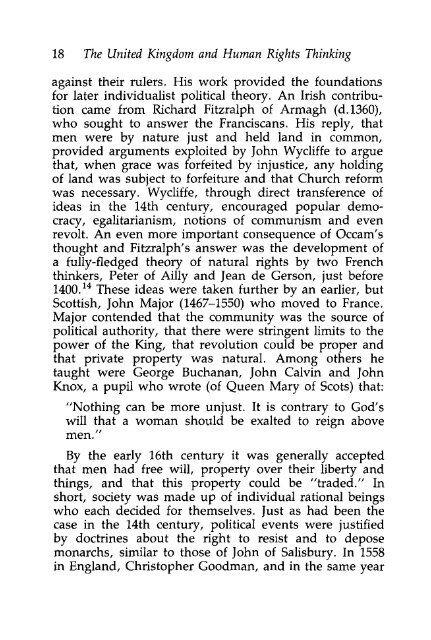The United Kingdom and Human Rights - College of Social ...
The United Kingdom and Human Rights - College of Social ...
The United Kingdom and Human Rights - College of Social ...
You also want an ePaper? Increase the reach of your titles
YUMPU automatically turns print PDFs into web optimized ePapers that Google loves.
18 <strong>The</strong> <strong>United</strong> <strong>Kingdom</strong> <strong>and</strong> <strong>Human</strong> <strong>Rights</strong> Thinking<br />
against their rulers. His work provided the foundations<br />
for later individualist political theory. An Irish contribution<br />
came from Richard Fitzralph <strong>of</strong> Armagh (d.1360),<br />
who sought to answer the Franciscans. His reply, that<br />
men were by nature just <strong>and</strong> held l<strong>and</strong> in common,<br />
provided arguments exploited by John Wycliffe to argue<br />
that, when grace was forfeited by injustice, any holding<br />
<strong>of</strong> l<strong>and</strong> was subject to forfeiture <strong>and</strong> that Church reform<br />
was necessary. Wycliffe, through direct transference <strong>of</strong><br />
ideas in the 14th century, encouraged popular democracy,<br />
egalitarianism, notions <strong>of</strong> communism <strong>and</strong> even<br />
revolt. An even more important consequence <strong>of</strong> Occam's<br />
thought <strong>and</strong> Fitzralph's answer was the development <strong>of</strong><br />
a fully-fledged theory <strong>of</strong> natural rights by two French<br />
thinkers, Peter <strong>of</strong> Ailly <strong>and</strong> Jean de Gerson, just before<br />
1400. 14 <strong>The</strong>se ideas were taken further by an earlier, but<br />
Scottish, John Major (1467-1550) who moved to France.<br />
Major contended that the community was the source <strong>of</strong><br />
political authority, that there were stringent limits to the<br />
power <strong>of</strong> the King, that revolution could be proper <strong>and</strong><br />
that private property was natural. Among others he<br />
taught were George Buchanan, John Calvin <strong>and</strong> John<br />
Knox, a pupil who wrote (<strong>of</strong> Queen Mary <strong>of</strong> Scots) that:<br />
"Nothing can be more unjust. It is contrary to God's<br />
will that a woman should be exalted to reign above<br />
men."<br />
By the early 16th century it was generally accepted<br />
that men had free will, property over their liberty <strong>and</strong><br />
things, <strong>and</strong> that this property could be "traded." In<br />
short, society was made up <strong>of</strong> individual rational beings<br />
who each decided for themselves. Just as had been the<br />
case in the 14th century, political events were justified<br />
by doctrines about the right to resist <strong>and</strong> to depose<br />
monarchs, similar to those <strong>of</strong> John <strong>of</strong> Salisbury. In 1558<br />
in Engl<strong>and</strong>, Christopher Goodman, <strong>and</strong> in the same year

















